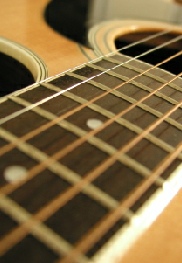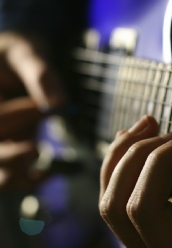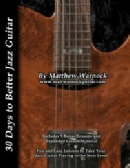

| Terms of Use | Privacy Policy | Teachers Wanted | Downloads | Legal | Returns Policy | Prize Rules |




Internet Guitar Lessons
Professional Lessons
At Affordable Prices









Free guitar lessons
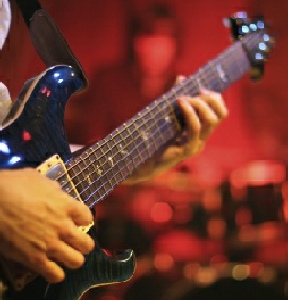



Learn from the best teachers around the world from the comfort of your own home
Featured Teachers
- Bill Hart
- Duncan Jones
- Emrys Baird
- Jim Covington
- Colin Cartmell
- Daniel Realpe
- Simon James
- Pauric Mather
- Niels Vejlyt
- David Bond
- Matt Warnock
- Dylan Kay
- Andrea Basiola
- MDS
- Carlos Viegas
- Matt Pearce

Learn the following styles:
- Rock
- Blues
- Country
- Classical
- Jazz
- Jazz Fusion
- County Rock
- Pop
- Bluegrass
- Slide
- Heavy Metal
- Shred

E-books Available from our shop:
- Deryl Gabel
- David Bond
- Duncan Jones
- Matt Warnock
- Pauric Mather

Blog
We have an extensive range of blog articles from guest writers such as:
Tom Hess
Andrea Basiola
Colin Cartmell

Free Blues Guitar Lessons
William Handy (16/11/1873 - 28/03/1958) is credited as being the father of Blues, he took an essentially regional music and made it into a national art form. He heard the blues whilst working a “shovel brigade” and was taken with the power of the southern work songs
Huddie Ledbetter
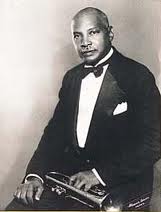
William Handy
By the time of the 1920’s the blues was spreading, with performers such as Charley Patton, Son House, Willie Brown, Bo Carter coming on the scene
The 1930’s saw rise of the now famous Robert Johnson. Generally accepted as the master of the style call “Mississippi Delta Blues”
During his short life he did not receive much commercial success however his recordings between 1936-1937 have become hugely influential
Robert Leroy Johnson (May 8, 1911 – August 16, 1938) showed on his records a combination of singing, guitar skills and songwriting talent. His life was poorly documented and with his early death at the age of 27 many myths and legends have grown up around him.
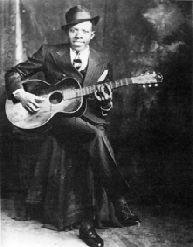
Robert Johnson
The 1940’s saw the shift of the blues scene to Chicago, The likes of Elmore James, Willie Mabon, Jimmy Rogers, Otis Spann, Muddy Waters, Howlin Wolf and John Lee Hooker come to prominence. Songs like Hoochie Coochie Man, Mannish Boy are still covered to this day.
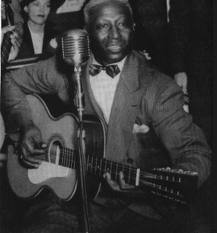
 A Brief History of the Blues
A Brief History of the Blues
What Are the Blues?
This is the name given to a musical genre that originated in the African - American community predominately from the “Deep South” of America.
Beyond that definition is a deeper meaning, the “blues” referred to s state of mind amongst the community, people talked of playing and singing to rid themselves of the blues. It was a music born out of the suffering and torment of a people and as such has a connection with all people irrespective of race or religion. We all suffer and have troubles the music of the blues connects directly in to those feelings.
The blues in the beginning was written largely by people who couldn't read or write and had no music training. Improvisation was and still is a key component of the style, to facilitate this, musical patterns evolved in order to make it easy to come together and make music. The 12 bar blues was born, and crystallised in the early 20th Century as a three line stanza, with the singer repeating the same lyrics twice and improvising the third.
This simplicity allowed performer to express themselves with a lot of emotional freedom, underpinned with a fixed harmonic structure that all blues performers knew how to play.
From the Delta to Chicago
To start with the blues was a African slave art form, born out of the struggle to survive the harsh treatment and conditions as well as keep their cultural roots alive. These plantation work songs followed a leader and chorus form with an emphasis on rhythm and meter to help get the work done and lift their spirits at the same time.
Work songs evolved in to solo calls or “hollers”, closer in feel to blues than plantation work songs. One blues performer who took the works songs on to become blues is Huddie William Ledbetter ( 20/01/1888 - 12/06/1949) who with his virtuosic 12 string guitar playing introduced the world to his folk standards.
Blues in the 1950’s saw the electrification of the instruments and further development of the different styles of blues. The electric guitar blues became synonymous with Chicago, people talked about Chicago blues which was heavily influenced by Mississippi blues.
Blues during the 1950 began to have heavy influence on American Popular music, Chuck Berry and Bo Diddley, Elvis Presley took the blues and added their own elements losing the more melancholic aspects along the way. Towards the end of 1950’s the Chicago West Side sound came to prominence, pioneered by Magic Sam , Buddy Guy and Otis Rush.
The 1960’s saw the influence of Blues spread further in the United Kingdom artists such Eric Clapton in Cream, Rory Gallagher, John Mayall & the Bluesbreakers reinterpreted blues classics and introduced them to whole new audience. They in turn influenced British Pop, with the Beatles, The Rolling Stones all having their roots in blues.
Why is blues so popular ?
The blues influence can be seen in virtually all modern musically genres, Country, Jazz, Rock, Pop, Heavy Metal all have their roots in some way from the blues. That can be interpreted as the universal connection the blues and its themes has with all people irrespective of race or religion. Its also the nature of people coming together to express music and improvise, never knowing quite what's going to come out.
Lets face it what more emotion could you wring from a blues phrase featuring bent strings and vibrato? You certainly don't get the same rawness from a Piano player.
Blues Who’s Who
- Luther Allison
- Charlie Baty
- Wayne Bennett
- Clarence Gatemouth Brown
- Billy Butler
- Albert Collins
- Johnny Clyde Copeland
- Robert Cray
- Ford Snooks Eaglin
- Ronnie Earl
- David Honeyboy Edwards
- Robben Ford
- Lowell Fulson
- Anson Funderburgh
- Buddy Guy
- John Hammond
- Jonny Heartsman
- John Lee Hooker
- Albert King
- B.B King
- Little Milton
- Robert Lockwood
- Lonnie Mack
- Brownie McGhee
- John Mooney
- Matt Murphy
- Duke Robillard
- Jimmy Rogers
- Freddie Roulette
- Otis Rush
- Son Seals
- Paul Senegal
- Johnny Shines
- Hubert Sumlin
- Mick Taylor
- Luther Tucker
- Jimmy Vaughn
- Stevie Ray Vaughn
- Joe Louis Walker
- Johnny Winter
- 17/08/1939-12/08/1997
- Charlie Baty
- 13/12/1931 - 28/11/1992
- 18/04/1948 - 10/09/2005
- 15/12/1925
- 01/10/1932 - 24/11/1993
- 27/03/1937 - 03/07/1997
- 01/08/1953
- 21/01/1936 - 18/02/2009
- 10/03/1953
- 28/06/1915 - 29/08/2011
- 16/12/1951
- 31/03/1921 - 07/03/1999
- 14/11/1954
- 30/07/1936
- 13/11/1942`
- 09/02/1937 - 27/12/1996
- 22/08/1922 - 21/06/2001
- 25/04/1923 - 21/12/1992
- 16/09/1925
- 07/09/1934 - 04/08/2005
- 27/03/1915 - 21/11/2006
- 18/07/1941
- 30/11/1915 - 16/02/1996
- 03/04/1955
- 29/12/1927
- 04/10/1948
- 03/06/1924 - 19/12/1997
- 03/05/1939
- 29/04/1939
- 14/08/1942 - 20/12/2004
- 14/01/1944
- 26/04/1915 - 20/04/1992
- 16/11/1931 - 04/12/2011
- 01/06/1938 - 19/01/1969
- 20/01/1936 - 18/06/1993
- 20/03/1951
- 03/10/1954 - 27/08/1990
- 25/12/1949
- 23/02/1944
- Electric Blues
- Electric Blues
- Electric Blues
- Electric Blues
- Jazz / Blues
- Electric Blues
- Texas Blues
- Electric Blues
- Electric Blues
- Electric Blues
- Delta Blues
- Electric Blues
- West Coast Blues
- Electric Blues
- Chicago Blues
- Electric Blues
- Electric Blues
- Electric Blues
- Electric Blues
- Electric Blues
- Electric Blues
- Delta Blues
- Electric Blues
- Folk Blues
- Electric Blues
- Electric Blues
- Electric Blues
- Chicago Blues
- Chicago Blues
- Chicago Blues
- Electric Blues
- Electric Blues
- Electric Blues
- Chicago Blues
- Electric Blues
- Chicago Blues
- Texas Blues
- Texas Blues
- Electric Blues
- Electric Blues
Blues Styles
- African Blues
- Blues - Rock
- Boogie Woogie
- British Blues
- Canadian Blues
- Chicago Blues
- Country Blues
- Delta Blues
- Detroit Blues
- Electric Blues
- Gospel Blues
- Hill Country Blues
- Jazz Blues
- Kansas City Blues
- Louisiana Blues
- Memphis Blues
- Piano Blues
- Piedmont Blues
- R & B
- Soul Blues
- Swamp Blues
- Texas Blues
- West Coast Blues






